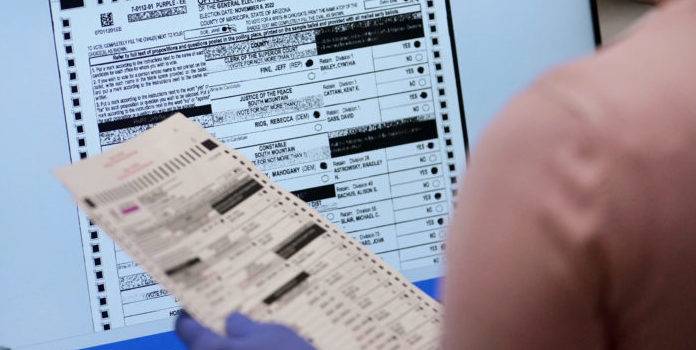(Headline USA) Georgia’s 2022 election season ended dramatically this past week, but that was because of the closely watched Senate runoff that solidified Democratic control of the chamber and not for any large-scale problems with voting.
That led Republicans in the state to say concerns over a 2021 law that imposed several new restrictions on voting were overblown.
“Georgia’s election system has been challenged and scrutinized and criticized and passed every test,” Republican Secretary of State Brad Raffensperger said in a statement after Tuesday’s runoff, citing high turnout.
Voting rights and community groups say their grassroots efforts to work around the new restrictions were key to the relatively strong turnout. But they also caution that they don’t know how many people might have been deterred from voting.
In his victory speech, Democratic Sen. Raphael Warnock said he did not share the rosy sentiment about this year’s election.
“Now there will be those both in our state, and across the country, who will point to our victory tonight and try to use it to argue there is no voter suppression in Georgia,” he said. “The fact that millions of Georgians endured hours in lines — and were willing to spend hours in line, lines that wrapped around buildings and went on for blocks, lines in the cold, lines in the rain — is most certainly not a sign voter suppression does not exist.”
The overhaul of the state’s election laws, known as Senate Bill 202, was passed by the Republican-controlled Legislature after Democrats won the 2020 presidential contest and two Senate runoff elections in early 2021.
The law shortened the time period to request an absentee ballot and addressed several issues that had arisen during the pandemic election of 2020. To ease the process for voters concerned about COVID-19, the state created an online portal for mail ballot requests while counties deployed drop boxes.
After the 2020 election, state lawmakers said voters should be required to sign absentee ballot applications by hand, meaning they needed access to a printer. And while lawmakers established drop boxes as legal, they put limits on how many could be used by each jurisdiction and when those boxes would be accessible. This resulted in fewer drop boxes in the state’s most populous counties.
The new law also required a driver’s license or other ID rather than a signature for requesting a mailed ballot.
Also under the law, the runoff period was shortened.
Gabriel Sterling, a top official in the secretary of state’s office, said in an interview “the mechanics went through beautifully” while acknowledging the tight turnaround time between general elections and runoffs presented challenges for officials. That was especially true in processing mail-in ballot requests and dealing with postal delivery delays at some locations.
The new law shortened the runoff period from nine weeks to four weeks.
He said a main reason for long lines at early voting locations was that some local election offices had fewer locations for the runoff than during the general election. Fulton County, which includes Atlanta, had 13 fewer early voting locations for the runoff than it did for the Nov. 8 general election, Sterling said. Those decisions were made by local election officials, not the secretary of state’s office.
It’s impossible to determine whether Georgia’s new elections law discouraged anyone from voting, and turnout can be affected by a number of factors, including the weather and enthusiasm about the candidates.
Overall turnout during the general election was 56.9% of registered voters, according to the secretary of state’s office, which certified the results. That roughly aligns with the turnout rate from the last midterm four years ago, even though a record number of midterm ballots were cast, given that more voters are on the rolls. That dropped to just over 50% for the runoff.
Turnout does not tell the whole story, said Xakota Espinoza, spokesperson for the Georgia voting rights group Fair Fight. Long lines, voter challenges, limited early voting and fewer drop boxes are barriers, she said.
“So it’s not just this cut and dry, like, ‘Oh, well, were they able to vote or not?’” she said.
Democratic state Rep. James Beverly, the minority leader in the Georgia House of Representatives, said he wants to see a mechanism in place that would compel election officials to open more polling locations if wait times become excessive. Any election law changes ultimately will be up to Republicans, who have majorities in both houses of the Legislature and control the governor’s office.
“While we had record turnout, how many people did we lose because they walked away and said, ‘I don’t want to stand in line’?” Beverly said.
“People turned out in spite of SB202,” he said, “not because of SB202.”
Adapted from reporting by the Associated Press

